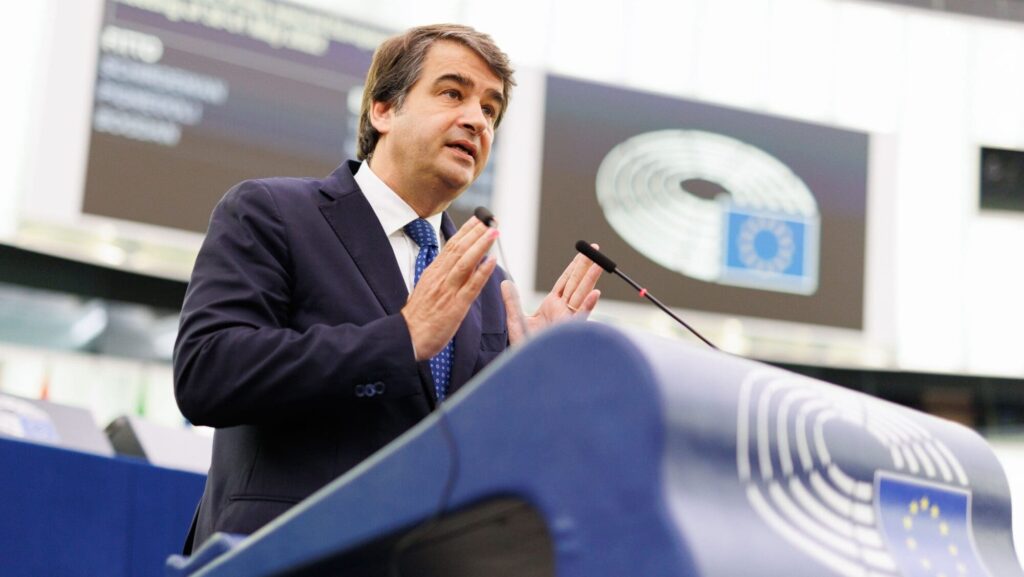
Italian EU Affairs Minister Raffaele Fitto in the European Parliament, 2022.
Photo: Matthieu Cugnot / © European Union 2022 – Source: EP
With Ursula von der Leyen reelected as Commission chief and the new Parliament constituted in Brussels, there’s one more step to conclude this year’s EU electoral cycle: appointing the members of the next College of Commissioners, the ‘ministers’ responsible for each portfolio in the second von der Leyen ‘cabinet.’
Italy has not yet officially named its candidate for commissioner, but it’s been an open secret for months that the job is set aside for Raffaele Fitto, the country’s current EU Affairs Minister. If he is appointed as head of an influential portfolio, Fitto’s task will not only be to increase Italy’s standing in Brussels but also to serve as a bridge that allows Italian PM Giorgia Meloni—and by extension her European Conservative and Reformist (ECR) group—to march further toward the mainstream power-center of the EU.
Unlike the soft-Eurosceptic majority of the rank-and-file of Meloni’s Fratelli d’Italia party which, together with its comrades in ECR, is still being described as “far-right” by the Left, Fitto is a veteran EU politician who served nearly for a decade as an MEP, knows the EU institutions inside out, and is held in high regard on both sides of the political spectrum—a position that few in Brussels can pride themselves of.
“Mr. Fitto is the perfect bridge-builder because he’s very diplomatic, and he’s politically well attuned,” said Johan van Overtveldt, a Belgian MEP from the national conservative New Flemish Alliance (N-VA). Similarly to Fratelli, N-VA has also been softening its nationalist rhetoric in exchange for mainstream recognition both at home and in the EU, belonging to those in ECR who wish to narrow the gap between the national conservatives and the center.
Back home, Fitto is often described as a ‘democristiano’ (Christian democrat), which in the Italian context is a regular label for moderate and pragmatic politicians with a considered, middle-of-the-road approach to divisive issues.
Fitto’s reputation is also untainted by association with the earlier, more extreme Fratelli of recent history, as the politician was a member of late PM Berlusconi’s center-right Forza Italia until 2018, when he decided to switch camps after being one of the first to recognize the changing mood of Italian politics. It’s no surprise that Fitto is also endorsed by Forza leader Antonio Tajani, who said he was the “best possible candidate” Italy could send.
Furthermore, Fitto’s future role in Brussels must be viewed in the context of what went down during and immediately after the EU elections. In June, Giorgia Meloni was the only major EU leader who emerged from the race with a much stronger democratic mandate than when she entered, while others like Chancellor Scholz and President Macron suffered major defeats.
Thus, Meloni showed up at the Council negotiations about nominating the next EU Commission chief knowing that she had the strongest hand in the room—only to be outplayed by the ‘losers’ who put forth von der Leyen again without even having to trade any promises in exchange for Italy’s support. Although the center tried to somewhat rectify this ‘insult’ later in the parliament by lifting the cordon sanitaire on the ECR and letting the party take several vice presidencies and committee chairs, the relationship between Meloni and von der Leyen remained strained after the latter chose to rule with a leftist grand coalition instead of listening to the voters.
After all this, therefore, the main signal behind the likely nomination of Fitto is that Meloni is still ready to move past this conflict and work with the centrist forces in a constructive manner instead of sending a ‘troublemaker’ who’d rather amplify the conservative opposition’s voice in Brussels, now mostly represented by the new Patriots for Europe group.
At the same time, this peace offering also leaves the ball in von der Leyen’s court. Member states can only nominate commissioners, but it’s up to the president to distribute the portfolios. This means Rome expects von der Leyen to reciprocate the gesture by awarding it with not just any influential post, but the Commission vice-presidency overseeing several economic and budget portfolios.
In the past, Fitto demonstrated that he knew his way around money, especially EU funds. Serving as EU affairs minister for the past two years, he’s been handling Italy’s nearly €200 billion share of post-pandemic recovery funds and so far managed to secure 58% of it, well above the EU average. “He has always understood that you need to have relations with those who hold the keys to the [public] purse,” an unnamed ‘old acquaintance’ of Fitto told Politico recently.
The only question is whether Rome’s strategy will succeed. Even if Fitto would fit in much better than anyone else from Right, budget- and economy-related portfolios are the most sought-after in Brussels, and it’s unlikely that the center-left coalition would easily give up trying to secure them for itself. At the same time, distributing the 27 seats is a highly complex negotiating process that can yield surprising results.
EU countries have until August 30th to submit their candidates to the president-elect, who then submits her choices for parliamentary approval in October. If all goes well, the second von der Leyen Commission will begin its work on November 1st.
